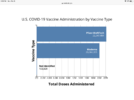K, thanks.
Update...
Here's what I got so far (in millions):
- Pfizer: 300 doses (150 people vaccinated). End of March, 120 doses. End of May (originally end of June), 100 doses. End of Summer, 100 doses.
- Moderna: 300 doses (150 people vaccinated). End of March, 100 doses. End of May (originally end of June), 100 doses. End of Summer, 100 doses.
- Astrazeneca/Oxford: 150 doses (75 people vaccinated). End of May, 75 doses. End of Summer, 75 doses.
- Novavax: 110 doses (55 people vaccinated). End of May, 110 doses.
- J&J: 200 doses (an extra 100 was ordered) which is 200 people vaccinated (only 1 dose needed). End of March, 60 doses. End of June, 40 doses. End of Summer, 100 doses.
That is a total of 715 people vaccinated. Twice the population of the U.S.
Timeline in adults vaccinated and percentage of all adults:
- End of March: 210 adults vaccinated. 68% of all adults.
- End of May: 280 more adults vaccinated for a total of 490 theoretical adults vaccinated. 159% of all adults.
- End of Summer: 225 more adults vaccinated for a total of 715 theoretical adults vaccinated. 231% of all adults.
We could hit herd immunity by the end of March. Certainly by the end of April unless the three other vaccines never get approved.


